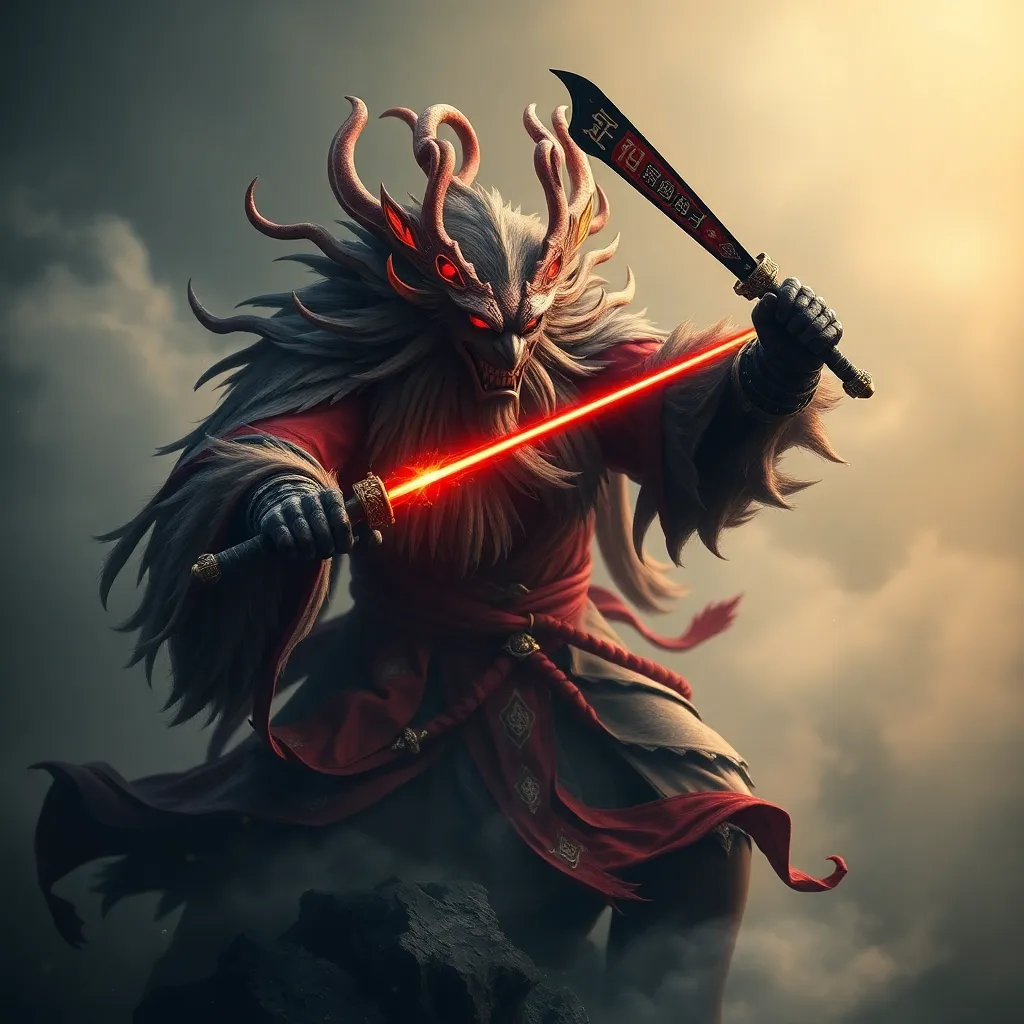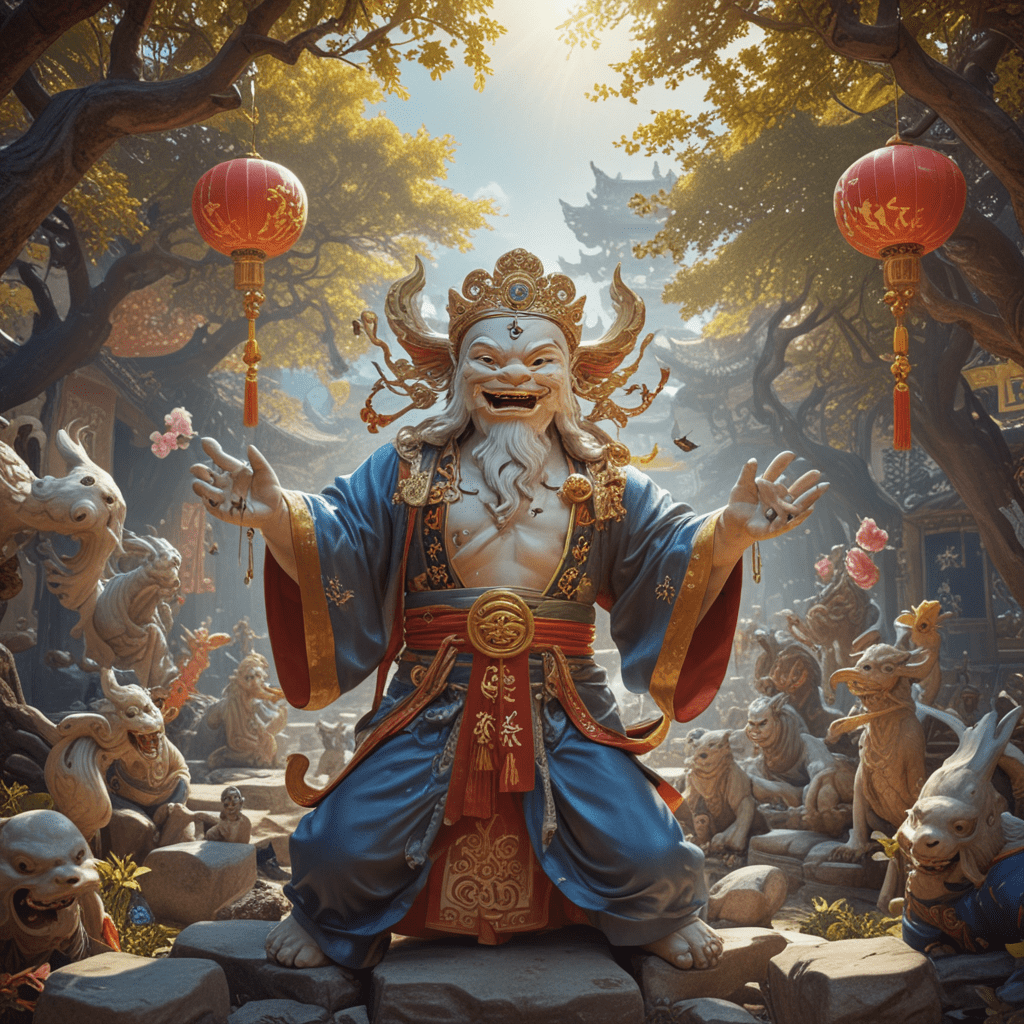The Tengu’s Influence on Chinese Martial Arts: Exploring the Tengu’s Martial Prowess
I. Introduction to Tengu in Mythology
The Tengu, a fascinating creature from Japanese folklore, has captured the imagination of many throughout history. These mythical beings are often depicted as humanoid figures with supernatural abilities, possessing both bird-like and human traits. The origins of the Tengu can be traced back to ancient Chinese legends, which were later adapted and evolved in Japanese culture.
In folklore, Tengu are often seen as symbols of martial prowess, embodying both strength and cunning. They are revered as skilled fighters and are said to possess extraordinary powers that allow them to soar through the skies and manipulate their surroundings. This article aims to explore the significant influence that Tengu mythology has had on Chinese martial arts, highlighting the rich interplay between myth and martial practice.
II. Historical Context of Tengu in East Asian Culture
Over time, the figure of the Tengu has evolved, influenced by various cultural exchanges between China and Japan. Originally, Tengu were viewed as protective deities in China, associated with mountains and forests. However, as these legends traveled to Japan, they transformed into more complex figures, characterized by their martial abilities and mischievous nature.
Cross-cultural exchanges between China and Japan have played a pivotal role in shaping the Tengu’s image and significance. As Chinese martial arts spread to Japan, the Tengu became intertwined with martial practices, contributing to the popularization of martial arts across East Asia. The Tengu’s association with both wisdom and combat prowess made them ideal figures to inspire martial artists seeking to enhance their skills.
III. The Tengu’s Martial Prowess: Skills and Techniques
Tengu are reputed for their exceptional martial skills, often depicted as masters of various fighting techniques. These beings are said to have the ability to master the art of combat swiftly, often training under the tutelage of ancient warriors or even the Tengu themselves. Key techniques associated with Tengu lore include:
- Flight and Agility: Tengu are often depicted as being able to fly and move with incredible speed and agility, which symbolizes the importance of movement in martial arts.
- Weapon Mastery: Tengu are known for their proficiency with weapons, particularly the naginata and various traditional Japanese weapons.
- Stealth Techniques: Drawing from their supernatural origins, Tengu are often associated with stealth and deceptive tactics in combat.
Comparatively, many historical martial arts techniques in China, such as Tai Chi, Wing Chun, and various forms of kung fu, emphasize fluid movements, agility, and the use of weapons. This similarity highlights a shared philosophy of martial practice that transcends cultural boundaries.
IV. The Tengu’s Influence on Chinese Martial Arts Styles
The influence of Tengu mythology can be seen in several Chinese martial arts styles. Some of the notable styles that have incorporated Tengu-inspired techniques include:
- Shaolin Kung Fu: Known for its comprehensive training methods and incorporation of animal movements, Shaolin practitioners often draw inspiration from Tengu’s agility and combat skills.
- Wudang Tai Chi: The principles of balance and fluid movement in Tai Chi resonate with the Tengu’s mythical prowess, emphasizing harmony in combat.
- Bagua Zhang: The circular movements and evasive techniques in Bagua Zhang reflect the Tengu’s agility and strategic approach to combat.
Notable martial arts schools, such as the Shaolin Temple, have also embraced Tengu narratives as part of their training philosophy, highlighting the role of mythology in shaping martial arts practices. In contemporary martial arts, many practitioners integrate Tengu-inspired techniques to enhance their training and understanding of combat.
V. Symbolism of the Tengu in Martial Arts Philosophy
The Tengu serves as a powerful symbol within martial arts philosophy, often depicted as a teacher or mentor in martial arts narratives. In these stories, Tengu impart essential lessons to warriors, emphasizing the importance of discipline, respect, and wisdom in martial practice.
Key lessons drawn from Tengu philosophy include:
- Embracing Duality: The Tengu embodies both aggression and restraint, teaching martial artists to balance power with control.
- Continuous Learning: The Tengu’s mastery of combat reflects the idea that martial artists must always strive to learn and evolve.
- Respect for Nature: Tengu are often associated with the natural world, reminding practitioners of the importance of harmony with their environment.
VI. Tengu in Popular Culture and Martial Arts Media
The influence of Tengu extends beyond traditional martial arts into popular culture, where they are frequently represented in films, literature, and video games. Tengu imagery has become synonymous with martial arts branding, often used to evoke a sense of mystique and power.
Examples of Tengu representation in popular culture include:
- Films: Movies such as “The Last Samurai” and “Ringu” feature characters inspired by Tengu mythology, showcasing their martial abilities.
- Video Games: Many fighting games incorporate Tengu characters, emphasizing their agility and combat skills as central gameplay mechanics.
- Literature: Novels and manga frequently portray Tengu as wise mentors or formidable opponents, further solidifying their role in martial arts narratives.
These representations have significantly impacted martial arts branding and promotion, making Tengu a recognizable symbol within the martial arts community.
VII. Contemporary Relevance of Tengu’s Influence
In recent years, there has been a resurgence of interest in traditional martial arts, with many practitioners exploring the historical and mythical roots of their practices. Workshops and seminars focusing on Tengu-inspired techniques have gained popularity, offering martial artists a unique opportunity to deepen their understanding of combat.
Modern martial arts communities are increasingly incorporating Tengu philosophy into their training, fostering an environment that values respect, discipline, and the continuous pursuit of knowledge. This integration of Tengu-inspired techniques and teachings reflects a broader trend of honoring cultural myths within martial arts.
VIII. Conclusion
The Tengu’s lasting influence on Chinese martial arts is a testament to the rich interplay between mythology and martial practice. As symbols of martial prowess and wisdom, Tengu encourage practitioners to strive for balance and mastery in their training. The importance of cultural myths in shaping martial arts cannot be overstated, as they provide valuable lessons and inspiration for practitioners seeking to refine their skills.
In light of this exploration, readers are encouraged to delve into Tengu-inspired practices within their own training. By embracing the teachings and techniques associated with Tengu, martial artists can enhance their journey toward mastery and personal growth.



